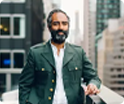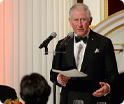The late British comedian Les Dawson used to joke that if he was on television quiz show Mastermind, his specialist subject would be the universe and all its contents.
Viewers could be forgiven for thinking that science presenter Brian Cox has taken Dawson's joke as a challenge in his latest series Universe, a BBC Studios Science Unit Production with NOVA and WGBH Boston for BBC and PBS, co-produced by video-sharing platform Xigua Video and CMG Film, Drama and Documentary Programming Center, in partnership with the Open University, which can be seen on CCTV-9 and Xigua Video, from Nov 28.
Cox is a household name in the United Kingdom, perfectly straddling the divide between serious academia and mainstream accessibility, as is borne out by his string of hugely popular series and also his sell-out speaking tours, filling arenas around the world talking about astrophysics.
His latest Horizons lecture tour will be visiting Hong Kong's Asiaworld Expo next year, as Cox, who was a successful professional musician before becoming more famous as a science broadcaster, gets back out on the road.
He said the experience of filming the five-part series-covering stars, galaxies, alien worlds, black holes, and the universe itself-in a pandemic had drastically curtailed the number of locations that could be used, and this had impacted the series, making it a testament to the strange times in which it was made.
"Things like lockdown change filming, visually and intellectually," he told China Daily.
"A good example is the galaxies episode, filmed almost exclusively in the Isle of Skye, off the coast of Scotland. From that came the idea that islands are a metaphor for galaxies-they evolve as eco-systems, and operate in quite an isolated way because they're so far apart, so they evolve as islands, but over longer time they do interact through galactic collisions.
"We quoted John Donne's poem'No man is an island entire of itself; every man is a piece of the continent, a part of the main; if a clod be washed away by the sea, Europe is the less… any man's death diminishes me, because I am involved in mankind.'
"No person is an island but a product of their interaction with other human beings, and there's a deep moral message to that. What appears to be a constraint shapes the series. The whole series became more reflective. As a film maker, the emotional historical context should seep into the film you make, so even though the pandemic has got nothing to do with the subject matter, it made it a more reflective film."














